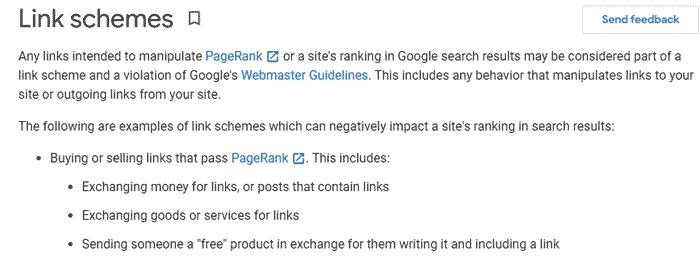Buy Backlinks: This is the definitive guide to buying backlinks in 2023.
If you ask me, as far as SEO is concerned, the most important ranking factor after content is backlinks.
But the problem is earning quality backlinks is a tough task.
This is not only me saying, every webmaster will admit that link building is a challenging and time-consuming affair.
Even worse, particularly for beginners, it’s hard to do at scale.
Since it is hard to get authority links, many marketers look for some easy alternatives to get backlinks. Buying backlinks is one of them.
You will agree with me, paying for backlinks is one of the most controversial practices in online marketing.
So, in this article, I will try to throw some light on the various aspects related to buying backlinks.
First, let’s see Google’s take on buying backlinks.
Here is what Google says on link buying:

Let me explain:
First of all, Google is against link-acquisition practices of any kind. In other words, it hates link building.
Second, it says, any links (to your site or from your site) “intended to manipulate page rank” “can” negatively impact your site’s ranking in SERP.
This means buying backlinks from “obvious sources” can harm your site’s SEO performance.
Here, my emphasis is on “obvious sources”. These include private blog networks (PBN), links from spam sites, comment spam, poor-quality directories, and other unnatural link schemes, etc.
Google says links should be earned, not built. But the fact is, it is far from the truth.
How?
If you observe Google SERP, you’ll realize that most of the top-ranking pages are from high authority sites with hundreds of thousands of backlinks.
These publications drive millions of daily traffic and each new piece of content they post will naturally get huge eyeballs and get shared. In turn, these posts get more passive backlinks from hundreds of sites.
This makes it almost impossible for a new site with virtually zero DA to rank on Google or any other search engine.
To summarize, if you’re a new site, you have no backlinks. If you have no backlinks you are not going to rank on SERP.
So, no links mean no ranking. No ranking means no traffic to your site. No traffic means you won’t make any money.
It’s a kind of vicious cycle that you need to break.
Pros and Cons of Buying Backlinks
In this section, I’ll try to address your every concern. Let’s discuss them one by one:
1) Should I pay for backlinks?
Paying for backlinks is a controversial SEO strategy. There are a few reasons behind this. First, Google webmaster guidelines. As per Google, creating any kind of links for SEO is not recommended.
But, to rank high, you need to build authority backlinks and a lot of them.
Since earning quality backlinks is not easy, many site owners prefer to purchase backlinks for quick results.
But the problem with this approach is that it comes with a huge risk. If you are caught paying for links, sooner than later, Google will catch you.
Once caught, you will vanish from search results. Therefore, I recommend you not to buy back links, at least from obvious sources.
These include low-value spam sites such as so-called multi-niche news portals.
Likewise, avoid Fiverr gigs. Similarly, don’t buy links from private blog networks (PBN).
You can, however, pay a few bucks for guest posting on the genuine blogs in your niche.
Make sure these sites are getting real organic traffic. Also, these sites should not be inviting guest posts aggressively. Also, there should be a very limited number of guest posts on the site.
2) Is buying backlinks illegal?
Another frequently asked question is, is it illegal to buy backlinks. No, it’s not illegal. Governments will not put you behind the bars for paying for backlinks.
However, it is unethical in the eyes of Google. If Google finds you purchasing backlinks, it can penalize you – from degrading your search rankings to completely de-indexing your site from search results.
Now it is up to you how much risk you are willing to take.
3) It is safe to buy backlinks for SEO?
Another question is: Is buying backlinks good for SEO or will paying for links harm my SEO?
My answer: It depends.
As mentioned before, backlinks are an integral part of SEO. While good backlinks will help you rank high on search engine result pages (SERPs), bad links may harm your SEO.
Buying backlinks is considered a blackhat tactic. But, many marketers buy backlinks selectively (read, without bypassing Google guidelines) and get desired SEO results.
However, buying backlinks carries more risk than benefits.
4) What about “buy cheap backlink” services?
Many companies offer different buy backlinks packages. All of them claim to offer backlinks from distinct sites with real organic traffic. Many of such domains are high DA sites.
On this, again, my advice is to practice caution. If you are planning to buy backlinks from these services, scrutinize the sites thoroughly. Check for their backlink profile, traffic, content quality, and niche relevancy.
5) What if I buy backlinks from high DA/DR sites?
To be honest, it’s not easy to buy links from big publications. Authority sites don’t sell links. Instead, some of them allow guest posts. If you manage to get backlinks from top sites, these are supposed to be of high value.
6) Can I buy expired domains with backlinks?
This approach is also debatable. Earlier it used to work. Marketers used to buy expired domains with tons of backlinks and redirect them to money sites.
But this is not the case this year. Google is smarter now. An expired domain with a bad link profile will cause more harm than good.
7) How much does it cost to buy backlinks?
So, what’s the cost of buying links?
It varies.
While a backlink from a smaller site may be available for as little as $10, a backlink from a DA 90 site can cost you up to $10,000.
For example, Michelle from Making Sense of Cents charges around $5,000 per post (source). It’s not even such a big site. Especially if you compare it with sites like HuffPost or Forbes.

According to a study by Ahrefs, in 2018, the average cost of purchasing a backlink was $361.44 and the average cost of a paid guest post was $77.80.
In general, the cheaper the backlink, the less it’s worth.
By now, I hope you know why you should not buy backlinks.
Still, if you are willing to take the risk, below are some tips when buying backlinks for your new site:
What kind of backlinks to avoid?
- Don’t buy “cheap” backlinks in bulk.
- Don’t buy backlinks from unknown and spammy sites.
- Buying backlinks from Fiverr is the worst idea.
- Don’t buy backlinks before you know where the links will be placed.
- Don’t buy backlinks from sites that publicly sell them.
- Don’t buy backlinks from private blog networks (PBN).
- Never purchase links from link farms or so-called “news” sites.
Buy Backlinks: How to Minimize the Risk
Generally speaking, buying backlinks from authority sites is relatively less risky. Such sites include government sites, university sites, and high-authority sites in your industry/niche.
Don’t get me wrong. I don’t recommend paying for backlinks. But if you want to pay for backlinks anyway, below are some steps you’ll want to consider to reduce the risk.
1. Paid guest posts.
Many owners allow paid guest posts on their blogs. Some offer it publicly, others do it without openly asking for it. Usually, small to medium-sized blogs charge money in exchange for guest post links.
Find relevant blogs in your industry and check if they allow guest posts. Talk to them. If allowed, create a high-quality piece and get it published on their blog.
Caution: Make sure you check their backlink profile and Moz spam score before you proceed. Any link from a spam site, even if the content is good, can harm your site’s SEO.
2. Get links from fellow bloggers.
Niche-relevant contextual links are the most valuable ones.
Whether you pay for a link or not, getting links from niche relevant blogs is the best practice.
If you could negotiate with fellow bloggers in your industry, you can buy backlinks without teasing Google.
In other words, you have bought a link from a niche blog without any SEO risk.
Again, don’t forget to confirm their spam score and content quality.
Even better, you can get a chance to guest post on their blog and get valuable backlinks without paying for it.
3. Buy backlinks from reliable services only.
Should you purchase backlinks from service providers?
Well, it depends on the quality of the backlinks they build. There are thousands of link-building services. It is your responsibility to choose only the good ones.
Beware, if someone is selling “cheap” backlinks. This is a warning sign that the links will be of poor quality. Only spammy sites can sell “cheap” backlinks. Avoid them at all costs.
However, some firms provide reliable services. They check each site before offering it to a limited number of customers. You may have to pay a premium for such services. Even in that case, my advice is not to buy links at all.
Fortunately, several better methods have been proven to produce results. Some of the best link-building tactics include:
1) Guest blogging on authority blogs. Read our Guide on Guest Posting (The Right Way).
2) Broken link building. Here’s our step-by-step guide to broken link-building.
3) Content Marketing. Learn how to earn authority backlinks with content marketing.
4) Digital PR. Promote your content on social media, forums, news sites, etc. You can also do paid promotions like Facebook boosted posts, Google ads, etc.
5) If you want to go even further, hire an SEO content marketing consultant.
So, is it worth it to buy backlinks?
To sum up, don’t buy backlinks. If you are planning to buy backlinks for SEO, you are inviting trouble. It’s very risky.
Instead plan to earn authority backlinks from quality sites in your industry.
So you can take Google’s advice with a grain of salt. Avoid “obvious sources” and focus on proven link-building tactics.
This way you can scale the link-building process without breaching the Google webmaster guidelines.
To your SEO success!
JD Bhatala is a Content Marketing Strategist with over 15 years of experience. He is the co-founder of Web Content Edge where he helps online businesses gain visibility and increase traffic, leads, and sales. Catch him online at Twitter or LinkedIn.

